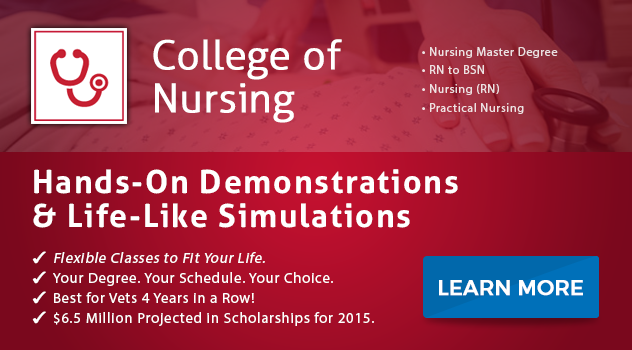
A career in nursing usually starts with an associate's degree. As a nurse, you could be responsible for direct patient care, maintaining medical records, dispensing medication and many other healthcare-related tasks. Helping others improve their health and overcome illnesses and injury is very rewarding. By becoming a nurse, you could help save the lives of thousands. Here are some of the facts about nursing and how to earn your license.
- According to Gallup, for more than a decade nurses have held the top spot as the most trusted profession. More than 4 out of 5 Americans believe that nurses have high or very high ethical standards.
- Nurses make up the single largest sector in healthcare. With more than 2.6 million nurses currently employed in the United States, there are more nurses than there are doctors, pharmacists, or dentists.
- More than half of all healthcare students enroll in a nursing program.
- Nursing is also one of the biggest single employment sectors across all industries. 3.1 million registered nurses are licensed to practice in the United States. Of these, 84.8 percent currently work in nursing.
- Nurses who work in hospitals follow a course of treatment through until a patient is released. A physician may develop the treatment plan, but the nursing staff carries it out. Nurses work side-by-side with doctors, but they are not assistants like many people think. Instead, nurses carry out a practice which can include case management, direct patient care, and establishing quality-of-care standards.
- Nurses often deliver long-term care in facilities like nursing homes and rehabilitation centers. Hospitals employ 58 percent of licensed nurses, but there are many other opportunities in healthcare, like nursing homes, home healthcare, mental health facilities, schools, and the military, just to name a few.
- Over the next eight years, almost 1 million nurses are expected to retire. Currently, 60 percent of nurses are age 50 or older. That translates into a large block of nurses, all retiring over the next ten to 15 years. The need for new nurses entering the profession has never been higher. With almost two-thirds of all nurses expected to retire and the simultaneous retirement of Baby Boomers across the United States, nursing care becomes an even more critical component of modern healthcare.
- There is already a nurse shortage, and it is only expected to grow as older nurses retire. The number of graduates has not increased rapidly enough to combat the issue. By 2020, The Journal of the National Cancer Institute reports that the shortage is expected to reach at least 400,000, with many of those shortages directly affecting hospitals.
 According to the Bureau of Labor Statistics, the median annual salary for nurses is $66,640 with the potential to earn more than six figures, depending on the geographic location and type of health care provided. A variety of specialized positions allows nurses to enter fields like surgical nursing and pediatric nursing. The top ten percent of nurses earn a median salary of $98,880 while the lowest ten percent still bring in a respectable $45,880.
According to the Bureau of Labor Statistics, the median annual salary for nurses is $66,640 with the potential to earn more than six figures, depending on the geographic location and type of health care provided. A variety of specialized positions allows nurses to enter fields like surgical nursing and pediatric nursing. The top ten percent of nurses earn a median salary of $98,880 while the lowest ten percent still bring in a respectable $45,880.- Licensed RNs have the option to pursue career advancement through higher learning and specialization. From nurse leaders and educators to practitioners and midwives, the options are many.
- Earning an associate's degree in nursing is enough for entry level employment in this rewarding field. According to the United States Government Accountability Office, 45.4 percent of newly licensed nurses enter the field with an associate's degree in nursing. Most of these programs involve two to three years of education, partially in the classroom and partially in a clinical setting. Both bachelor’s and associate’s degrees in nursing require graduates to take and pass the same test to qualify for licensing - the NCLEX-RN.
- An associate's degree in nursing is available from hundreds of schools across the country, but more than 75,000 qualified students are turned away each year due to a lack of qualified teaching staff. It can take several applications before acceptance to a nursing program, but many schools run programs year-round, so you might only have to wait for a few months.
Earn an Associate’s Degree in Nursing at ECPI University
Nursing offers you the opportunity to help others while entering a profession with lots of growth potential. If you want to become a nurse, consider earning an Associate of Applied Science Degree in Nursing. You could earn your degree in as little as 18 months! Contact ECPI today to get started—it could be the Best Decision You Ever Make!
I'm super excited Danielle signed up at ecpi to become a nurse along side me
— Taylor Harlow (@Taylor_harlow) September 20, 2015
DISCLAIMER – ECPI University makes no claim, warranty, or guarantee as to actual employability or earning potential to current, past or future students or graduates of any educational program we offer. The ECPI University website is published for informational purposes only. Every effort is made to ensure the accuracy of information contained on the ECPI.edu domain; however, no warranty of accuracy is made. No contractual rights, either expressed or implied, are created by its content.
Gainful Employment Information – Nursing (RN) - Associate’s
For more information about ECPI University or any of our programs click here: http://www.ecpi.edu/ or http://ow.ly/Ca1ya.


